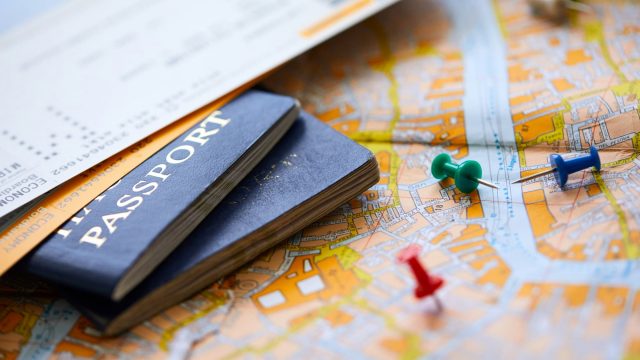Jet lag. Two words to invoke horror in many. You’ve arrived somewhere for your dream holiday but you’re worried you’ll spend the first few days half asleep and missing all the excitement. Well, it doesn’t have to be that way. If you understand jet lag and prepare properly, you may hardly even notice it. So here are our top tips for how to cope with jet lag. Alternatively, check out our tips for a stress free start to your holiday.
 Photo by: gustavofrazao/Fotolia
Photo by: gustavofrazao/Fotolia
What is jet lag?
Jet lag is a temporary sleeping disorder that can occur when you travel between 2 time zones. The quicker you cross the time zone, and the more zones you cover, the worse you’ll feel. In some cases it can take 1 day per time zone crossed to recover – not good if you’re travelling to the other side of the world.
 Photo by: martin951/Fotolia
Photo by: martin951/Fotolia
If travelling around the world, try and keep going in one direction – east to west as jet lag is generally worse when you travel west to east. So if you want to go to New Zealand, fly to Los Angeles then New Zealand and come back via Malaysia or Hong Kong.
What causes jet lag?
In layman’s terms, jet lag occurs when your body clock is thrown out of sync.
In scientific terms, jet lag occurs when your circadian rhythm is out of sync.
We are used to a regular pattern of light and darkness at certain times of the day and any dramatic changes to that can really upset our body clock. Circadian rhythm is your normal 24 hour routine and is controlled by your hypothalamus.
 Photo by: Arkady Chubykin/Fotolia
Photo by: Arkady Chubykin/Fotolia
The hypothalamus is a part of the brain which controls hormone production. It essentially tells you when you’re hungry, thirsty, or even tired. The hypothalamus receives signals from your eyes regarding light and dark and responds accordingly. When it’s dark the hypothalamus steps up production of melatonin which helps induce sleep. When it’s light, the hypothalamus stops production.
By controlling your eye’s exposure to bright light, you can keep the hypothalamus working to a normal schedule even when crossing time zones. Consider wearing sunglasses to limit the amount of light the hypothalamus is subjected to.
If you cross many time zones quickly, you’re circadian rhythm must catch up and re-sync which can take time.
How to cope with jet lag
Before you fly
Change your sleeping pattern a few days before departure
People with a regular pattern of dinner at 7pm and bed at 10pm are more likely to be hit by jet lag. Try and relax your body clock and change your bed time:
Travelling east? Go to bed an hour earlier than normal.
Travelling west? Go to bed an hour later than normal.
Jet Lag Rooster uses a calculator that allows you to enter departure and destination and other personal details which are combined to create a new sleeping plan.
Ensure you’re well rested
Jet lag isn’t as bad if you’ve had a good night’s sleep before you travel.
Eat sensibly
Don’t have a large meal just before you fly as your body isn’t used to metabolizing at different times.
During travel
Stopover
If possible, plan a stopover. This will lessen the effects of jet lag as you adapt to a new time zone that isn’t as extreme.
Drink lots of water
Dehydration can worsen the effects of jet lag. Drink plenty of water and avoid alcohol and caffeine.
Eat sensibly 2
Think about your destination. When will they be eating? Don’t eat your evening meal at 3am destination time.
Exercise
Ensure you get up and walk around regularly. Do toe curls, spell the alphabet with your feet etc. Not only will this give you something to do but it will help prevent Deep Vein Thrombosis (DVT).
Change your watch early
Don’t leave it until you land. By setting your watch to your destination time you’ll find it easier to adjust to the new time zone.
 Photo by: Richard Villalon/Fotolia
Photo by: Richard Villalon/Fotolia
Upon arrival
Naps
You should ensure you get as much sleep in a 24 hour period as normal. If you normally get 7 hours sleep and have only had 3 – go to sleep for 4 hours or have a few naps to even out.
Get out in the sun
If it’s daylight when you arrive, try and stay in it as long as possible to help your body clock reset quicker.
Eat sensibly 3
Again, don’t have a large meal the moment you arrive (or for the first day). This will help reduce the chances of travel related indigestion.
Stay on home time
If you’re only travelling for a few days, it may be worth staying on UK time (or wherever home is). Formula 1 drivers do this and it doesn’t seem to bother them!
Jet lag symptoms
OK, you’ve made it! You’ve arrived but aren’t feeling 100%, is that jet lag or something else?
Well, the symptoms for jet lag include:
- Disturbed sleep pattern
- Indigestion & loss of appetite
- Constipation or diarrhoea
- Nausea
- Difficulty concentrating
- Feeling disorientated
- Anxiety & irritability
- Clumsiness
- Lack of energy
- Confusion or memory loss
- Headaches
- Sweating
- Muscle soreness
If you have any tips for beating jet lag, let us know below.
Now you know how to cope with jet lag, make sure you don’t forget to sign up to our newsletter and follow us on Twitter and Facebook for the latest travel tips and news.
Subscribe to our newsletter
Want our blogs emailed direct to you? Sign up below to get updates featuring our blogs and car hire top tips. Receive the best deals on car hire straight to your inbox.





